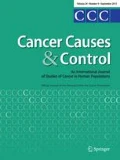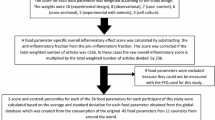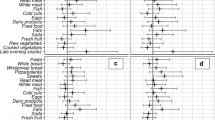Abstract
Purpose
Diet and inflammation have been suggested to be important risk factors for esophageal squamous cell cancer (ESCC). In this study, we examined the association between the dietary inflammatory index (DII) and ESCC in a case–control study conducted between 1992 and 1997 in Italy.
Methods
This study included 304 ESCC cases and 743 controls hospitalized for acute non-neoplastic diseases. The DII was computed based on dietary intake assessed by a reproducible and valid 78-item food frequency questionnaire. Logistic regression models were used to estimate odds ratios (ORs) conditioned on age, sex, year of interview, and area of residence and adjusted for education, smoking, alcohol drinking, BMI, physical activity, and aspirin use. Energy adjustment was performed using the residual method.
Results
Subjects with higher DII scores (i.e., with a more pro-inflammatory diet) had a higher risk of ESCC, with the DII being used as both a continuous variable (ORcontinuous 1.39, 95 % confidence interval, CI, 1.25–1.54; one-unit increase corresponding to ≈12 % of its range in the current study) and a categorical variable (ORquintile5vs1 2.46, 95 % CI 1.40–4.36; p trend < 0.001).
Conclusion
These results indicate that a pro-inflammatory diet is associated with a higher risk of ESCC, even after controlling for alcohol and tobacco exposure.

Similar content being viewed by others
References
GLOBOCAN 2012 (IARC). Section of cancer surveillance (29/12/2014)
Keibel A, Singh V, Sharma MC (2009) Inflammation, microenvironment, and the immune system in cancer progression. Curr Pharm Des 15:1949–1955
Pan MH, Lai CS, Dushenkov S, Ho CT (2009) Modulation of inflammatory genes by natural dietary bioactive compounds. J Agric Food Chem 57:4467–4477
O’Sullivan KE, Phelan JJ, O’Hanlon C et al (2014) The role of inflammation in cancer of the esophagus. Expert Rev Gastroenterol Hepatol 8(7):1–12
Corley DA, Kerlikowske K, Verma R, Buffler P (2003) Protective association of aspirin/NSAIDs and esophageal cancer: a systematic review and meta-analysis. Gastroenterology 124:47–56
de Mello VD, Schwab U, Kolehmainen M et al (2011) A diet high in fatty fish, bilberries and wholegrain products improves markers of endothelial function and inflammation in individuals with impaired glucose metabolism in a randomised controlled trial: the Sysdimet study. Diabetologia 54:2755–2767
Khoo J, Piantadosi C, Duncan R et al (2011) Comparing effects of a low-energy diet and a high-protein low-fat diet on sexual and endothelial function, urinary tract symptoms, and inflammation in obese diabetic men. J Sex Med 8:2868–2875
Luciano M, Mottus R, Starr JM et al (2012) Depressive symptoms and diet: their effects on prospective inflammation levels in the elderly. Brain Behav Immun 26:717–720
Shivappa N, Steck SE, Hurley TG et al (2014) Designing and developing a literature-derived, population-based dietary inflammatory index. Public Health Nutr 17:1689–1696
Lin Y, Yngve A, Lagergren J, Lu Y (2012) Dietary intake of lignans and risk of adenocarcinoma of the esophagus and gastroesophageal junction. Cancer Causes Control 23:837–844
Qu X, Ben Q, Jiang Y (2013) Consumption of red and processed meat and risk for esophageal squamous cell carcinoma based on a meta-analysis. Ann Epidemiol 23(762–770):e761
Terry P, Lagergren J, Ye W et al (2001) Inverse association between intake of cereal fiber and risk of gastric cardia cancer. Gastroenterology 120:387–391
Shivappa N, Steck SE, Hurley TG et al (2014) A population-based dietary inflammatory index predicts levels of C-reactive protein in the Seasonal Variation of Blood Cholesterol Study (SEASONS). Public Health Nutr 17:1825–1833
Wirth MD, Burch J, Shivappa N et al (2014) Association of a dietary inflammatory index with inflammatory indices and metabolic syndrome among police officers. J Occup Environ Med 56:986–989
Shivappa N, Hebert JR, Rietzschel ER et al (2015) Associations between dietary inflammatory index and inflammatory markers in the Asklepios Study. Br J Nutr 113:665–671
Tabung FK, Steck SE, Zhang J et al (2015) Construct validation of the dietary inflammatory index among postmenopausal women. Ann Epidemiol 25:398–405
Wood LG, Shivappa N, Berthon BS et al (2015) Dietary inflammatory index is related to asthma risk, lung function and systemic inflammation in asthma. Clin Exp Allergy 45:177–183
Wirth MD, Burch J, Shivappa N et al (2014) Association of a dietary inflammatory index with inflammatory indices and metabolic syndrome among police officers. J Occup Environ Med/Am Coll Occup Environ Med 56:986–989
Wirth MD, Burch J, Shivappa N et al (2014) Dietary inflammatory index scores differ by shift work status: NHANES 2005 to 2010. J Occup Environ Med 56:145–148
Garcia-Arellano A, Ramallal R, Ruiz-Canela M et al (2015) Dietary inflammatory index and incidence of cardiovascular disease in the PREDIMED study. Nutrients 7:4124–4138
Lu Y, Shivappa N, Lin Y et al (2015) Diet-related inflammation and esophageal cancer by histological type: a nationwide case-control study in Sweden. Eur J Nutr. doi:10.1007/s00394-015-0987-x
Zamora-Ros R, Shivappa N, Steck S.E, Canzian F, Landi S, Henar Alonso M, Hébert JR, Moreno V (2014) Dietary inflammatory index and inflammatory gene interactions in relation to colorectal cancer risk in the Bellvitge colorectal cancer case-control study. Gene Nutr. 10(1):447. doi:10.1007/s12263-014-0447-x
Shivappa N, Prizment AE, Blair CK et al (2014) Dietary inflammatory index and risk of colorectal cancer in the Iowa Women’s Health Study. Cancer Epidemiol Biomark Prev 23:2383–2392
Tabung F, Steck S, Ma Y et al (2014) The association between dietary inflammatory index and risk of colorectal cancer among postmenopausal women: results from the Women’s Health Initiative. Cancer Causes Control 26(3):399–408
Shivappa N, Zucchetto A, Montella M et al (2015) Inflammatory potential of diet and risk of colorectal cancer: a case-control study from Italy. Br J Nutr 114(01):152–158
Shivappa N, Bosetti C, Zucchetto A et al (2014) Dietary inflammatory index and risk of pancreatic cancer in an Italian case-control study. Br J Nutr 113(02):292–298
Shivappa N, Bosetti C, Zucchetto A, Montella M, Serraino D, LaVecchia C, Hebert JR (2014) Association between dietary inflammatory index and prostate cancer among Italian men. Br J Nutr 113(02):278–283
Shivappa N, Jackson M, Bennett F, Hebert JR (2015) Increased Dietary Inflammatory Index (DII) Is associated with increased risk of prostate cancer in Jamaican men. Nutr Cancer. doi:10.1080/01635581.2015.1062117
Shivappa NBC, Prizment AE, Jacobs DR Jr, Steck SE, Hebert JR (2015) Association between inflammatory potential of diet and mortality in the Iowa Women’s Health Study. Eur J Nutr. doi:10.1007/s00394-015-0967-1
Bosetti C, La Vecchia C, Talamini R et al (2000) Food groups and risk of squamous cell esophageal cancer in northern Italy. Int J Cancer 87:289–294
Garcia M, Fernandez E, Borras JM et al (2005) Cancer risk perceptions in an urban Mediterranean population. Int J Cancer 117:132–136
Giacosa A, Barale R, Bavaresco L et al (2013) Cancer prevention in Europe: the Mediterranean diet as a protective choice. Eur J Cancer Prev 22:90–95
La Vecchia C, Bosetti C, Bertuccio P et al (2014) Trends in alcohol consumption in Europe and their impact on major alcohol-related cancers. Eur J Cancer Prev 23:319–322. doi:10.1097/CEJ.1090b1013e32836562f32836561
Pelucchi C, Galeone C, Negri E, La Vecchia C (2010) Trends in adherence to the Mediterranean diet in an Italian population between 1991 and 2006. Eur J Clin Nutr 64:1052–1056
Franceschi S, Negri E, Salvini S et al (1993) Reproducibility of an Italian food frequency questionnaire for cancer studies: results for specific food items. Eur J Cancer 29A:2298–2305
Decarli A, Franceschi S, Ferraroni M et al (1996) Validation of a food-frequency questionnaire to assess dietary intakes in cancer studies in Italy results for specific nutrients. Ann Epidemiol 6:110–118
Shivappa N, Steck SE, Hurley TG, Hussey JR, Ma Y, Ockene IS, Tabung F, Hebert JR (2013) A population-based dietary inflammatory index predicts levels of C-reactive protein in the Seasonal Variation of Blood Cholesterol Study (SEASONS). Public Health Nutr 10:1–9
Willett W, Stampfer MJ (1986) Total energy intake: implications for epidemiologic analyses. Am J Epidemiol 124:17–27
Hsieh CC, Maisonneuve P, Boyle P et al (1991) Analysis of quantitative data by quantiles in epidemiologic studies: classification according to cases, noncases, or all subjects? Epidemiology 2:137–140
Defago MD, Elorriaga N, Irazola VE, Rubinstein AL (2014) Influence of food patterns on endothelial biomarkers: a systematic review. J Clin Hypertens (Greenwich) 16:907–913
Lopez-Garcia E, Schulze MB, Fung TT et al (2004) Major dietary patterns are related to plasma concentrations of markers of inflammation and endothelial dysfunction. Am J Clin Nutr 80:1029–1035
Bravi F, Edefonti V, Randi G et al (2012) Dietary patterns and the risk of esophageal cancer. Ann Oncol 23:765–770
Chen W, Yang C, Yang L et al (2014) Association of roasting meat intake with the risk of esophageal squamous cell carcinoma of Kazakh Chinese via affecting promoter methylation of p16 gene. Asia Pac J Clin Nutr 23:488–497
Salehi M, Moradi-Lakeh M, Salehi MH et al (2013) Meat, fish, and esophageal cancer risk: a systematic review and dose-response meta-analysis. Nutr Rev 71:257–267
Tavani A, La Vecchia C, Gallus S et al (2000) Red meat intake and cancer risk: a study in Italy. Int J Cancer 86:425–428
Jessri M, Rashidkhani B, Hajizadeh B, Jacques PF (2012) Adherence to Mediterranean-style dietary pattern and risk of esophageal squamous cell carcinoma: a case-control study in Iran. J Am Coll Nutr 31:338–351
Pelucchi C, Bosetti C, Negri E et al (2011) Olive oil and cancer risk: an update of epidemiological findings through 2010. Curr Pharm Des 17:805–812
Liu J, Li Z, Cui J et al (2012) Cellular changes in the tumor microenvironment of human esophageal squamous cell carcinomas. Tumour Biol 33:495–505
Bonomi M, Patsias A, Posner M, Sikora A (2014) The role of inflammation in head and neck cancer. Adv Exp Med Biol 816:107–127
Acknowledgments
This study was supported by the Italian Foundation for Research on Cancer (FIRC), the National Cancer Institute grant R01 CA39742 and the Italian Ministry of Health, General Directorat of European and International Relations. Drs. Shivappa and Hébert were supported by grant number R44DK103377 from the United States National Institute of Diabetes and Digestive and Kidney Diseases.
Author information
Authors and Affiliations
Corresponding author
Ethics declarations
Disclosure
Dr. James R. Hébert owns controlling interest in Connecting Health Innovations LLC (CHI), a company planning to license the right to his invention of the dietary inflammatory index (DII) from the University of South Carolina in order to develop computer and smart phone applications for patient counseling and dietary intervention in clinical settings. Dr. Nitin Shivappa is an employee of CHI. The subject matter of this paper will have no direct bearing on the work of CHI, nor has any CHI-related activity exerted any influence on this project.
Rights and permissions
About this article
Cite this article
Shivappa, N., Zucchetto, A., Serraino, D. et al. Dietary inflammatory index and risk of esophageal squamous cell cancer in a case–control study from Italy. Cancer Causes Control 26, 1439–1447 (2015). https://doi.org/10.1007/s10552-015-0636-y
Received:
Accepted:
Published:
Issue Date:
DOI: https://doi.org/10.1007/s10552-015-0636-y




